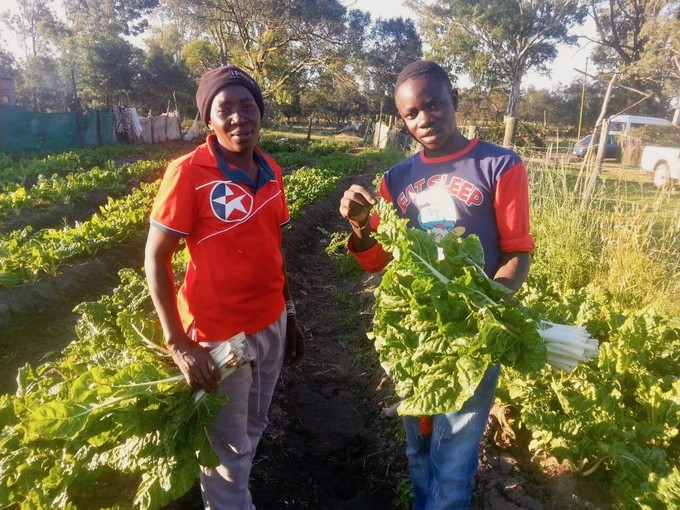“Locals are in love with spinach” says gardener
Zimbabwean widow grows hard to access fresh vegetables in PE
Touched by seeing children going to bed hungry and the people around her lacking sources of good nutrition, Marian Dube started growing and selling vegetables from her backyard.
The 42-year-old widow and mother of three, who grew up in a family of subsistence farmers in Mberengwa, south east of Zimbabwe, says, “I came to South Africa in 2006 and discovered that unlike in Zimbabwe, where most households have backyard gardens, there were very few in Pretoria.”
“I was even struggling to get shops that sold fresh vegetables. The shops that sold them were far away and often the price was very high. I could not afford to eat vegetables regularly for these reasons,” she says.
In 2008, she relocated to Green Bushes, Port Elizabeth. “The situation was the same as in Pretoria. I saw this niche market and grabbed the opportunity with both hands. I could not wait anymore to start a garden of my own,” says Dube.
Dube thanks her Zimbabwe school curriculum for playing a role in her success. “I studied agriculture as part of my high school education. My parents were also small scale farmers. This background helped me greatly.”
Her landlord allowed her to use the entire backyard for her garden, but did warn her to use water sparingly.
Dube initially worked in a restaurant and bought her first seedlings with her salary. She currently juggles the gardening project with a job as a cleaner at a nearby air pilot training school.
She concentrates on growing spinach, coriander and rape. “The locals are in love with spinach,” she says, and children must be “encouraged to eat vegetables to develop their bodies and to have a healthy mind.”
Dube says she can now harvest every fortnight on weekends, earning an average of R1,500 per harvest.
“I use this money to pay for the school fees of my three children. I also buy clothing and healthy food for them,” she says. Her two sons help her in the garden.
Dube says she can’t keep up with demand and she wants to diversify. “I supply a number of shops in Korsten town. I don’t have to move around selling my vegetables door to door because my clients are always phoning me for more supplies.
“At the same time, I don’t forget my local community. I sell them the vegetables at a highly discounted price because this community is poor. Unemployment and crime are very high here. Also cases of malnutrition have been reported.”
With the pressing need to expand, Dube says a local farmer offered her a piece of land in return for 10% of her profits, but she had to clear the land.
She says “everything went well in the early days”, but once she had cleared the land and her crops had started to grow, she was kicked off the farm.
“He only wanted me to do the donkey work of clearing his land,” she says. “I had heard of such scams in the Port Elizabeth area but I just ignored people who had warned [me] about such unscrupulous farmers. I lost a lot of money buying equipment to clear his land.”
This was three years ago. She now plans to approach the municipality for a larger plot. “I discovered that in Eastern Cape there is a high demand of okra, garlic and onions. I would like to grow these crops on a large scale. I also need to buy at least two large water tanks because the Nelson Mandela Bay Municipality often faces a shortage of water.
Support independent journalism
Donate using Payfast

Don't miss out on the latest news
We respect your privacy, and promise we won't spam you.
Next: No Christmas celebration for Rwandan asylum seeker
Previous: Immigrants picket Mashaba’s anti-immigrant comments
© 2016 GroundUp. 
This article is licensed under a Creative Commons Attribution-NoDerivatives 4.0 International License.
You may republish this article, so long as you credit the authors and GroundUp, and do not change the text. Please include a link back to the original article.

